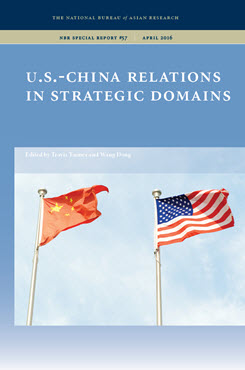Stepping Up Investments in U.S.-China Relations
Making People-to-People Exchange a Strategic Priority
This essay examines people-to-people (P2P) exchange between the U.S. and China and argues that this mechanism can serve as a vehicle to increase collaboration and reduce tension between the two countries on issues related to national security concerns.
EXECUTIVE SUMMARY
MAIN ARGUMENT
The U.S.-China relationship faces a critical juncture. Today the relationship is marked by progress in certain areas while simultaneously experiencing continued stalemate and simmering tensions in others. The stakes are high given the global implications of the two nations’ interactions with each other across a wide range of issues. One important mechanism to facilitate positive engagement and collaboration, as well as successfully manage tension and areas of disagreement, is P2P exchange. Though the impact of such exchanges is not always immediate, the long-term benefits of building common understanding, an ecosystem of experts on challenging security issues in both countries, clear communication channels, ground rules and mutually agreed-upon vocabulary for dialogue, and intellectual support for government officials are well worth the investment of time and resources.
POLICY IMPLICATIONS
- As the U.S.-China relationship matures, the type of P2P exchange should also evolve to include more dialogues oriented toward national security. Specifically, the two countries should consider creating a high-level channel within the Strategic and Economic Dialogue framework to orchestrate P2P activities (both Track 1.5 and Track 2) focused specifically on building collaboration on global strategic issues.
- P2P activities that focus on areas where the U.S. and China can collaborate will intrinsically build mutual understanding and trust, allowing for the two nations to engage in productive discussions on more sensitive issues. Washington and Beijing should develop a methodology to evaluate the effectiveness and impact of specific P2P exchanges.
- It is critical that the profile of individuals who participate in P2P exchange related to national security concerns expand beyond government officials and think tank scholars to include experts in the business, scientific, NGO, academic, and other expert communities.
- Given that the key for the future of the bilateral relationship rests in the hands of the next generation of leaders, the U.S. and China should invest in providing more opportunities for student exchanges to train this future generation of relationship managers.
Travis Tanner is Senior Vice President and Chief Operating Officer of the 100,000 Strong Foundation.
Zhao Minghao is a Member of the Academic Committee and a Research Fellow at the Pangoal Institution. He is also a Research Fellow at the Charhar Institute and an Adjunct Fellow at the Chongyang Institute for Financial Studies at Renmin University in China.
NOTE: The views presented in this essay are entirely the authors’ and do not reflect the views of the 100,000 Strong Foundation, the Pangoal Instiution, or the Chongyang Institute for Financial Studies at Renmin University. The authors would like to thank Elizabeth Chen, Kyle Churchman, Lei Yingdi, Li Zhaoying, Liang Xiaodon, and Justine Ty for their insightful research assistance.


